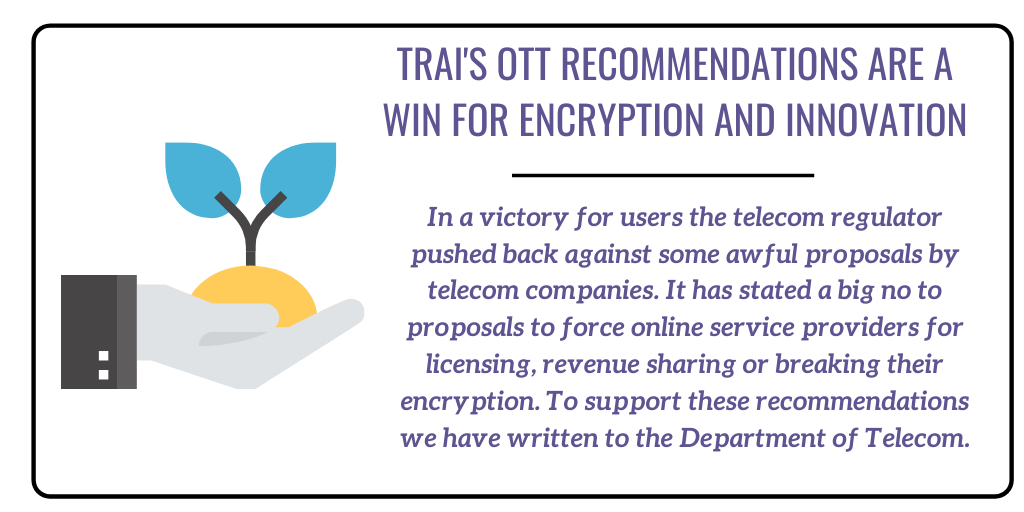
TLDR : The OTT Consultation Labyrinth
We have charted the five year history of the consultation process on the issue of licensing of Over-The-Top (OTT) services. It has been a winding and twisting journey.
This was one of the legacy issues of the historic SaveTheInternet.in movement which had two clear objectives. The first was to protect net neutrality through regulation, the second was to avoid any licensing of internet services and applications that could impact user choices.
We are almost at the end and the outcome to this process has been fairly positive. The telecom regulator, TRAI issued recommendations on September 14, 2020 accepting most demands by digital rights organisations on behalf of everyday internet users like you (also a snub to large telecom companies, ha!). These still need to be accepted by the Department of Telecom (DOT) for the final stamp of approval. On this we have written to the DOT indicating what elements of the present recommendations require clear approval.
Let’s take it from the beginning
On November 11, 2018 the TRAI released the consultation paper on Over-The-Top (OTT) Services. A consultation paper is the usual method how it provides a background and draws in comments from the public prior to forming a policy position.
OTT licensing is particularly scary. It ran the risk of licensing of online services, revenue sharing by website owners with telecom operators and even breaking encryption. OTT essentially expands to over-the-top, and here you may ask, well what does this mean? Over-the-top essentially reflected a telecom understanding of internet services -- which may be content streaming services, social media or food ordering, even map and messaging services that use the internet. As per several telecom operators these needed to be licensed so their profitability could be maintained. Questionable, right?
So, break down this issue into a more comprehensible and clear manner we consistently worked through 2019 and 2020 to unpack it. We first simplified the OTT consultation paper with a summary, an initial analysis, and even did number crunching to look at the broad economic trends in the telecom sector. This was to encourage more people to participate in an informed and evidence lead manner. We have followed this approach of encouraging public participation in further public consultations in which we now seek views on the Internet Freedom Forum.
Subsequent to this we submitted comments to this public consultation being organised by TRAI on Jan. 7, 2019 and counter comments to some awful proposals to license the internet and break end-to-end encryption on Jan. 21, 2020. We also attended an open house consultation. IFF is proud to have consistently worked on this issue which only was possible due to the large scale support of our growing membership, community and volunteers. We are happy that the essence of our submissions are reflected in the recommendations of the TRAI on September 14, 2020.
Let us toast the small victories!
On September 14, 2020 the TRAI issued clear recommendations that are broadly supportive of user choice and the submissions and counter-comments submitted by us! These were based on extensive feedback received from the IFF community.
1. Regulation from evidence on economic issues: The consultation raised some scary scenarios in which online service providers would have to pay telecom operators or share their revenues. This could have had a potential of scaring away global services and dulled local investment and product development. All of this would have impacted the choices for end users.
- What did we demand: “We hold a view that devising regulations to place regulatory burdens or financial levies on internet platforms and services by itself is not a sound public policy measure from the perspective of data. The objective of regulation should not be to protect the profits of companies, it should be to serve public welfare.” [comments / counter comments]
- What did we get: It’s great that the Telecom Regulatory Authority of India has taken a considered view and stated that at present that, “market forces may be allowed to respond to the situation without prescribing any regulatory intervention. However, developments shall be monitored and intervention as felt necessary shall be done at appropriate time.” We are largely supportive of this, even as we note that there is greater market concentration in the telecom industry than in the tech sector today. We had made this clear analysis based on data in our preparatory materials for this consultation.
2. A win for security and privacy: Most people in our community know that India lacks any clear, enforceable data protection law. This sucks for users. It puts them to risk. But it was more alarming when suggestions were being made to undermine and break encryption for law enforcement access. This would be a clear threat to the integrity of our communications.
- What did we demand: “We strongly hold onto the position of asking for reform of India’s surveillance law (including introducing judicial oversight such as directed in the Puttaswamy-Aadhaar Judgement) and defending the use and deployment of encryption technologies. We believe both these measures protect the privacy of individuals and also safeguard them from second order impacts such as identity and data theft, which in many cases today lead to social and economic harms.” [comments / counter comments]
- What did we get: Thankfully, the TRAI has implicitly endorsed the value of encryption technologies when it has stated that, “Imposition of any requirements to cater to get the details of communication in an intelligible form or clear text would either lead to change in the entire architecture of such OTT services which might not provide same level of protection as offered today or would require to introduce provisions which may make the agents involved in the communication vulnerable to unlawful actors.”
3. Regulatory framework for OTT Services: Here we had a more nuanced approach where we stated that telecom side regulation without identifying a core public policy objective (such as data protection) will be problematic. Here, if the objective is to ensure growth of the telecom sector, then having a regulator for OTT Services will be a solution that does not cater to the lack of growth or sustainability of investment. How? Well we cracked some numbers, and the TRAI surveying international practices broadly agreed with this assessment.
- What did we demand: “It bears repetition that the core thesis of a market failure and the need to correct regulatory imbalances is yet to be established. On the contrary our economic analysis shows that the economic stress is due to a period of hyper-competitiveness. We even dispute the arguments for substitutability of services between telcos and internet applications and services.” [comments / counter comments]
- What did we get: “It is not an opportune moment to recommend a comprehensive regulatory framework for various aspects of services referred to as OTT services, beyond the extant laws and regulations prescribed presently. The matter may be looked into afresh when more clarity emerges in international jurisdictions particularly the study undertaken by ITU.”
As much as we work in a challenging environment, it is important to remember public victories are possible even today. Sometimes, it’s easy if we TRAI! To take forward these victories to a positive conclusion yesterday we wrote to the DOT.
In the coming week we will also be addressing recommendations on both the Cloud Services Consultation Paper and the one for Traffic Measurement in which IFF participated to secure the interests of Indian internet users, like you!
Important Documents
- IFF’s letter to the DOT dated 26.09.2020 in support of TRAI’s recommendations on OTT Services (link)
- TRAI’s recommendations to the DOT on OTT Licensing (link)
- IFF's engagement on OTT Licensing Consultation (summary; initial analysis; broad economic trends; comments / counter comments).

